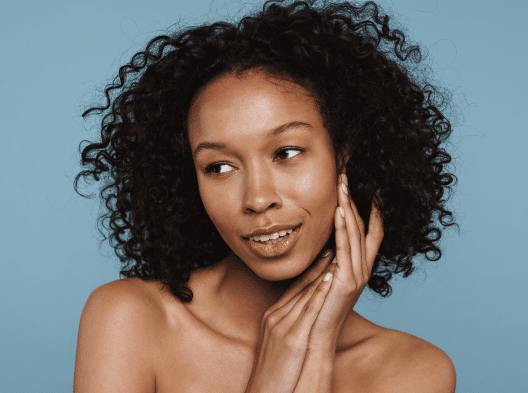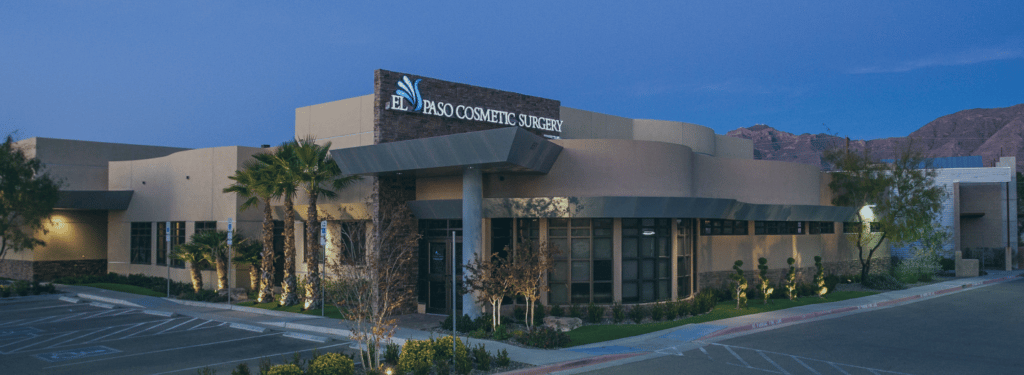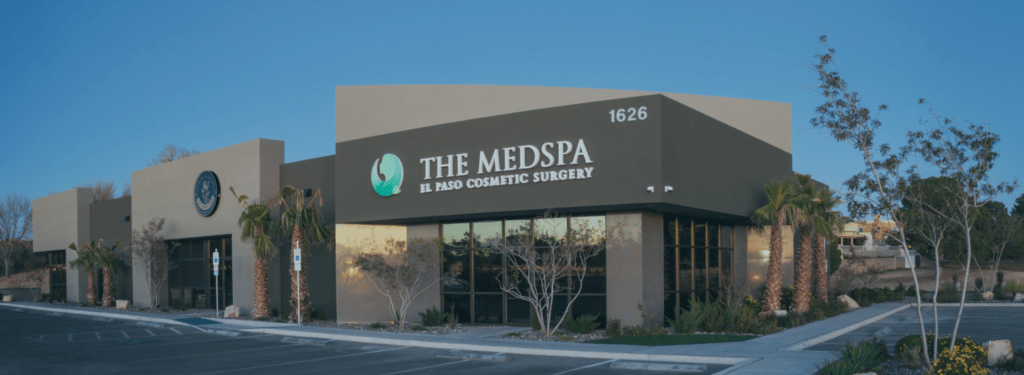Acne Treatments
At El Paso Cosmetic Surgery Center, we specialize in treating acne-prone skin. Our medical acne treatment center is designed to treat the individual’s needs depending on the severity of their condition. We can treat a range of conditions related to acne, including:
- Over-productive oil glands
- Whiteheads and blackheads
- Pustules acne
- Cystic acne

Developing Your Treatment Plan
You’re looking for an answer to your acne-prone skin, and we have the solutions. First, one of our Licensed Aestheticians will evaluate your skin with a skin analysis to determine the acne treatment method that is best for you. We usually recommend a combination of products, treatments, and techniques to maximize the results over a three to four month period.
Your lifestyle, age, skin type, and skin color are considered when determining your treatment. We will provide detailed information and training on safe ways to banish blackheads, whiteheads, and cystic acne, and get the clear skin you want. You will have a thorough discussion regarding your goals and a treatment plan.
Possible treatment options for acne include:
We can also recommend highly effective products from popular skincare lines such as Obagi®, SkinCeuticals®, and BioMedic. Our trained aestheticians can help you select the products that will work best for your specific skin type and condition.
Over-Productive Oil Glands (Oily Skin)
If you have oily skin, you can thank your sebaceous glands. They produce a substance called sebum, which is responsible for keeping the skin and hair moisturized. These units are found everywhere on the body except on the palms, soles, top of the feet, and lower lip. The number of pilosebaceous units is greatest on the face, upper neck, and chest.
During adolescence, sebaceous glands enlarge and produce more sebum under the influence of hormones called androgens. After about age 20, sebum production begins to decrease. When the process works correctly, your skin is moisturized and remains healthy.
If you have over-productive oil glands, the sebum spreads over the skin surface giving the skin an oily appearance, called seborrhea. If sebum gets trapped in the pore, acne can develop. At El Paso Cosmetic Surgery we have a wide array of techniques to deal with over-productive oil glands, oily skin, and acne. Make your appointment to meet with our caring, experienced staff, ready to help you deal with oily skin.
Blackheads and Whiteheads
Acne is the most common skin disease treated by physicians, but not all acne is the same. This is important to know because, when treated correctly, different types of acne require different methods of treatment.
Blackheads and whiteheads, known as comedones, can be more numerous on the face and shoulders than other types of acne. Good, consistent skin hygiene can help improve this condition. Therefore, knowing more about what causes comedones and how to treat them is a step towards clearer skin.
Blackheads
Blackheads, also known as open comedones, are follicles that have a wider than normal opening. They are filled with plugs of sebum and sloughed-off cells and have undergone a chemical reaction resulting in the oxidation of melanin. This gives the material in the follicle the typical black color.
Whiteheads
Whiteheads, also known as closed comedones, are follicles that are filled with the same material but have only a microscopic opening to the skin surface. Since the air cannot reach the follicle, the material is not oxidized and remains white.
Skincare for Both Blackheads and Whiteheads
The best skincare for comedones consists of once-a-day cleansing with a mild soap or facial scrub to aid in the removal of excess sebum and dead skin cells. Oil-based makeup should not be used since it can contribute to the buildup of oil in the follicles. Water-based makeup labeled as non-comedogenic can be used safely.
If simple cleansing does not take care of your blackheads and whiteheads, it’s time to make an appointment at El Paso Cosmetic Surgery. We have the techniques and expertise to help you achieve the healthy skin you want.
Pustules Acne
Pustules are considered to be a moderate form of acne that presents themselves as middle-sized bumps on the face. These bumps have a noticeably white or yellow dot in the center and are surrounded by inflammation.
You should not pop pustules yourself in the hope of obtaining a quick-fix cure. You may be able to reduce the size of the bump by popping it, but the effects, possible infection, and scars, are not worth the temporary relief. If improperly squeezed, pustules can spread quickly and cause deeper damage to the dermis. This is because the pus inside pustules is filled with white blood cells that can cause deep tissue inflammations.
Cystic Acne
Cystic acne, or nodulocystic acne, is the most severe form of acne vulgaris. Deep, inflamed breakouts develop on the face and/or other areas of the body. The blemishes themselves can become large, and some may measure up to several centimeters across.
Although many people use the term “cystic” to describe any type of severely inflamed acne, only those who develop cysts truly have cystic acne. Cysts are the most serious kind of acne blemish. They feel like soft, fluid-filled lumps under the skin’s surface. Cysts can be very painful. Cystic acne is not caused by a lack of cleansing, drinking soda, or eating sweets. The sufferer has done nothing to cause these skin problems.
Nodulocystic breakouts damage and destroy healthy skin tissue. Because of this, the likelihood of developing scars is extremely high. Picking at the skin and trying to pop cysts or nodules should be avoided at all costs. Doing so can greatly damage the skin, lead to scarring, and worsen acne. Aggressively treating this form of acne can help limit the severity of scarring. Acne of this severity can be hard to control, but at El Paso Cosmetic Surgery, we have the techniques and technicians to help you with Cystic Acne and get you back on the road to healthy skin.
The El Paso Cosmetic Surgery Difference
At our Acne Treatment Center, we provide professional care and consultation to choose the skin care treatments that are right for you!
You are unique, with your own skin type. It is vitally important to work with one of the Acne Treatment Center professionals before you start a skin treatment regimen, as they can help you address your individual skin concerns. All skin services are performed by our on-staff team which includes two aestheticians and four Registered Nurses, all overseen by our cosmetic surgeon Ozan Sozer, M.D.
Your skin deserves more than a random purchase off of a website…you deserve to never be left in the dark as to what is the best regimen for you. That’s why your acne treatment recommendations will be based on a personalized analysis of your skin. You can know that you are using the product that is right for you.
Don’t settle for less than optimum results. Rest assured when it comes to your skincare, the Acne Treatment Center professionals at El Paso Cosmetic Surgery are here for you!
Take the Next Steps
Look your best and feel confident. Get started by scheduling a consultation with our Skin Care Specialists by calling or texting (915) 351-1116. During this time, we’ll evaluate what kind of treatment would be most beneficial for YOU, as well as answer any questions or concerns that you might have about the treatment.

El Paso Surgical Center
Our state-of-the-art surgical center is a convenient and beneficial focal point of our practice, as it allows many of our patients to undergo cosmetic procedures without needing to visit a hospital. Not only does our surgical center simplify the surgical process, it also provides more personalized patient care and patient privacy.

The Medspa
Our Medspa is a luxurious, modern destination for your non-surgical aesthetic treatment needs. Our experienced nurse injectors, aestheticians, and skin care experts provide high-quality results from the newest and most advanced technologies. The Medspa offers a full spectrum of non-surgical treatments and services, so all of your cosmetic needs are located in one place.